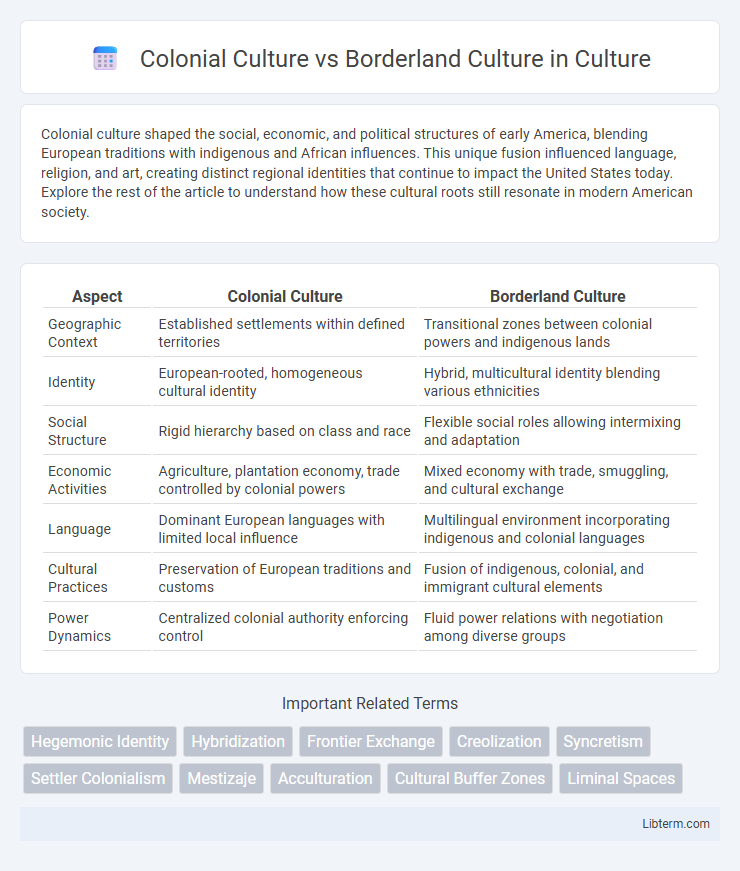Colonial culture shaped the social, economic, and political structures of early America, blending European traditions with indigenous and African influences. This unique fusion influenced language, religion, and art, creating distinct regional identities that continue to impact the United States today. Explore the rest of the article to understand how these cultural roots still resonate in modern American society.
Table of Comparison
| Aspect | Colonial Culture | Borderland Culture |
|---|---|---|
| Geographic Context | Established settlements within defined territories | Transitional zones between colonial powers and indigenous lands |
| Identity | European-rooted, homogeneous cultural identity | Hybrid, multicultural identity blending various ethnicities |
| Social Structure | Rigid hierarchy based on class and race | Flexible social roles allowing intermixing and adaptation |
| Economic Activities | Agriculture, plantation economy, trade controlled by colonial powers | Mixed economy with trade, smuggling, and cultural exchange |
| Language | Dominant European languages with limited local influence | Multilingual environment incorporating indigenous and colonial languages |
| Cultural Practices | Preservation of European traditions and customs | Fusion of indigenous, colonial, and immigrant cultural elements |
| Power Dynamics | Centralized colonial authority enforcing control | Fluid power relations with negotiation among diverse groups |
Defining Colonial Culture and Borderland Culture
Colonial culture is defined by structured governance, European traditions, and established settlements emphasizing economic exploitation and social hierarchies. Borderland culture emerges in frontier regions characterized by cultural blending, fluid identities, and hybrid practices resulting from the interaction of settlers, Indigenous peoples, and diverse ethnic groups. The dynamic nature of borderland culture contrasts with the more rigid and uniform colonial culture, highlighting adaptive responses to contested spaces.
Historical Contexts of Colonial and Borderland Societies
Colonial culture in North America developed primarily through European settlement focused on establishing structured communities with centralized governance and rigid social hierarchies, often emphasizing agricultural economies and European religious traditions. In contrast, borderland culture emerged in regions where diverse groups, including Indigenous peoples, Europeans, and enslaved Africans, interacted fluidly, fostering hybrid identities and adaptive social practices shaped by contested territories and economic exchange. The historical contexts of these societies reflect contrasting patterns of colonization: colonial societies prioritized control and assimilation, while borderland societies exhibited cultural hybridity and negotiation amid shifting political boundaries.
Power Dynamics: Authority in Colonies vs. Borderlands
Colonial culture centralized power through formal institutions, often reinforcing hierarchical authority aligned with the ruling empire's legal and political frameworks. Borderland culture, characterized by fluid identities and interaction among diverse groups, operated on negotiated power dynamics where local leaders and indigenous groups contested and adapted authority claims. The contrasting power structures reveal colonial dominance through imposed governance versus borderland pluralism shaped by hybrid social contracts and pragmatic alliances.
Interactions with Indigenous Populations
Colonial culture often imposed rigid social hierarchies and sought to dominate Indigenous populations through religion, language, and land acquisition, leading to significant cultural displacement and resistance. Borderland culture emerged in regions where European settlers and Indigenous peoples interacted more frequently, resulting in hybrid practices, intermarriage, and cultural exchange that shaped unique, syncretic identities. These borderlands served as zones of negotiation and adaptation, reflecting a dynamic interplay rather than unilateral colonial dominance.
Cultural Hybridity and Identity Formation
Colonial culture often imposed rigid identities through Eurocentric norms, while borderland culture exemplifies cultural hybridity, blending indigenous, colonial, and immigrant influences to create unique social fabrics. This hybridity fosters fluid identity formation, where individuals navigate multiple cultural frameworks simultaneously, challenging singular national or ethnic definitions. The intersection of languages, customs, and traditions within borderlands highlights the dynamic processes of cultural negotiation and identity reconfiguration in contested spaces.
Economic Systems and Resource Control
Colonial culture primarily established centralized economic systems driven by mercantilism and plantation agriculture, emphasizing resource extraction and trade controlled by colonial powers. Borderland culture developed more hybrid economic systems combining indigenous practices, barter economies, and small-scale farming, reflecting limited centralized control and fluid resource access. Resource control in borderlands was contested and shared among diverse groups, contrasting with the hierarchical and exploitative resource management typical of colonial economies.
Religious Influences and Spiritual Practices
Colonial culture often centered around established European Christian denominations, emphasizing organized worship, strict doctrinal adherence, and missionary efforts to convert indigenous populations. Borderland culture, influenced by the convergence of Native American, European, and African traditions, exhibited syncretic spiritual practices blending Christianity with animism, shamanism, and ancestral rites. This fusion created diverse religious expressions reflecting cultural exchange and adaptation in frontier regions.
Social Structures and Daily Life
Colonial culture featured rigid social hierarchies often dominated by European elites, emphasizing formal institutions like churches and town meetings, while borderland culture was more fluid, blending diverse ethnic groups and fostering adaptive, informal social networks. Daily life in colonial settlements centered around agriculture, community rituals, and maintaining European traditions, contrasted with the borderlands where survival demanded cooperation across cultural lines, trade with Native Americans, and flexibility in social roles. The borderland's hybridity created unique social dynamics, reflecting a mix of European, Indigenous, and African influences absent in the more homogenous colonial social order.
Language, Communication, and Exchange
Colonial culture often centered on standardized language rooted in European origins, emphasizing formal communication and written documentation to maintain administrative control and social hierarchy. Borderland culture, by contrast, exhibited linguistic hybridity and multilingualism, fostering dynamic oral communication and fluid exchange practices shaped by diverse indigenous, colonial, and immigrant groups. This fluid interaction in borderlands promoted unique creole languages, trade pidgins, and cultural syncretism, reflecting adaptive communication strategies crucial for survival and cooperation in contested spaces.
Lasting Legacies on Modern Cultures
Colonial culture has left lasting legacies on modern societies through established legal systems, language, and centralized governance structures rooted in European traditions. Borderland culture contributes to contemporary multicultural identities by blending indigenous, colonial, and immigrant influences, fostering cultural hybridity and fluid social practices. The interaction of these cultural dynamics shapes diverse national narratives and regional identities in post-colonial states.
Colonial Culture Infographic

 libterm.com
libterm.com